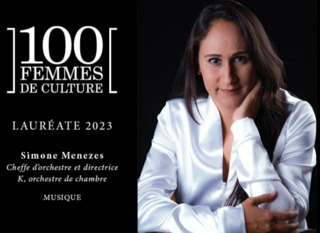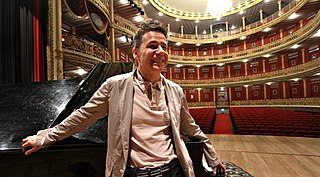Sonia Rubinsky is a Brazilian classical pianist.
Sonia Rubinsky is a Brazilian classical pianist.
Born in Campinas to a Polish mother and a Lithuanian father, Rubinsky lived in Brazil for the first thirteen years of her life; she later lived in Israel for seven years, then moved to New York. [1] She gave her first concert when she was six years old, [2] gave her first performance as soloist with orchestra when she was twelve, [2] and performed for Arthur Rubinstein when she was sixteen. Rubinsky studied with Vlado Perlemuter, [2] Beveridge Webster, Jacob Lateiner, Olga Normanha and William Daghlian, and graduated from the Juilliard School with a Doctor of Arts degree.
Rubinsky has performed as a soloist or with orchestras in North America, Europe, Israel and South America. She performs regularly in Brazil, notably with the Orchestra of the Theatro Municipal of Rio de Janeiro and of São Paulo, the Brazilian Symphony Orchestra, the Campinas Symphony, and the São Paulo State Symphony. She has received the prestigious William Petschek Award as well as a "Best Recitalist of the Year" award from the São Paulo Association of Music Critics. She won the Carlos Gomes Prize as Pianist of the Year in 2006, and won a Latin Grammy Award, [1] in 2009, for Best Recording of the Year for the 8th disc in a series of complete piano works of Heitor Villa-Lobos, on the Naxos label.
Rubinsky has recorded the complete piano works of Heitor Villa-Lobos for the Naxos label. [3] She has also recorded music by John Adams, Debussy, Mozart and others for the Nonesuch/Elektra, Daghlian, Albany Records and Algol Editora labels.

Magdalena Maria Yvonne Tagliaferro was a Brazilian pianist of French parentage.
Débora Halász is a Brazilian classical pianist and harpsichordist.

Ilan Rechtman is an Israeli pianist, composer and music director.

Chôros No. 10 is a work for chorus and orchestra written in 1926 by the Brazilian composer Heitor Villa-Lobos. It is part of a series of fourteen numbered compositions collectively titled Chôros, ranging from solos for guitar and for piano up to works scored for soloist or chorus with orchestra or multiple orchestras, and in duration up to over an hour. Chôros No. 10 is of moderate length, one performance recorded by the composer lasting just under thirteen minutes.

Chôros No. 12 is an orchestral work written between 1925 and 1945 by the Brazilian composer Heitor Villa-Lobos. It is part of a series of fourteen numbered compositions collectively titled Chôros, ranging from solos for guitar and for piano up to works scored for soloist or chorus with orchestra or multiple orchestras, and in duration up to over an hour. Chôros No. 12 is one of the longest compositions in the series, a performance lasting about 35 minutes.

Chôros No. 9 is an orchestral work written between 1929 and 1942 by the Brazilian composer Heitor Villa-Lobos. It is part of a series of fourteen numbered compositions collectively titled Chôros, ranging from solos for guitar and for piano up to works scored for soloist or chorus with orchestra or multiple orchestras, and in duration up to over an hour. A recorded performance of Chôros No. 9 made by the composer lasts almost 28 minutes.

Chôros No. 6 is an orchestral work written between 1925 and 1942 by the Brazilian composer Heitor Villa-Lobos. It is part of a series of fourteen numbered compositions collectively titled Chôros, ranging from solos for guitar and for piano up to works scored for soloist or chorus with orchestra or multiple orchestras, and in duration up to over an hour. Chôros No. 6 is one of the longer compositions in the series, lasting about 25 minutes in performance.

Chôros No. 8 is a work for orchestra and two pianos, written in 1925 by the Brazilian composer Heitor Villa-Lobos. It is part of a series of fourteen numbered compositions collectively titled Chôros, ranging from solos for guitar and for piano up to works scored for soloist or chorus with orchestra or multiple orchestras, and in duration up to over an hour. A recording of Chôros No. 8 conducted by the composer lasts 22 minutes.

Symphony No. 7, Odisséia da paz is a composition by the Brazilian composer Heitor Villa-Lobos, written in 1945. A performance lasts about 30 minutes.

Symphony No. 8 is a composition by the Brazilian composer Heitor Villa-Lobos, written in 1950. A performance lasts about 25 minutes

Symphony No. 10, Sumé pater patrium: Sinfonia ameríndia com coros (Oratorio) is a composition by the Brazilian composer Heitor Villa-Lobos, written in 1952–53. The broadcast performance of the world-premiere performance under the composer's direction lasts just over 67 minutes.

Symphony No. 11 is a composition by the Brazilian composer Heitor Villa-Lobos, written in 1955. A performance lasts about twenty-five minutes.
Bernette Epstein, known as Yara Bernette, was a Brazilian classical pianist. Considered one of Brazil's foremost pianists of the twentieth century, she achieved international renown for her performance of Classical and Romantic works, notably those of Rachmaninoff, Mozart, Chopin, Debussy, and Brazilian composer Heitor Villa-Lobos, in concerts in Brazil, Europe, and the United States. She chaired the piano department at the Hochschule für Musik und Theater Hamburg, Germany, from 1972 to 1992.

The Piano Concerto No. 4, W505, is a composition for piano and orchestra by the Brazilian composer Heitor Villa-Lobos, written in 1952. A performance lasts about 27 minutes.

Piano Concerto No. 1, W453, is a composition for piano and orchestra by the Brazilian composer Heitor Villa-Lobos, written in 1945. A performance lasts about 38 minutes.

The Piano Concerto No. 5, W 521, is a piano concerto by the Brazilian composer Heitor Villa-Lobos, written in 1954. One performance recorded under the composer's baton lasts 18 minutes, 48 seconds.

The Piano Concerto No. 2, W487, is a piano concerto by the Brazilian composer Heitor Villa-Lobos, written in 1948. A performance lasts about 28 minutes.

The Piano Concerto No. 3, W512, is a composition for piano and orchestra by the Brazilian composer Heitor Villa-Lobos, written in 1952–57. A performance lasts about 26 minutes.

Simone Menezes is an Italo-Brazilian conductor based in France.

Marcelo Bratke is a Brazilian pianist.